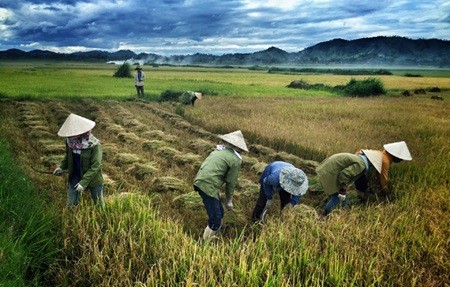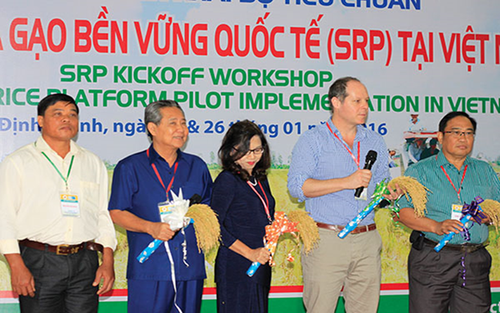(VOVworld) – Agricultural production remains a pillar of the national economy as Vietnam integrates into the world. The current need is to improve productivity and quality and lower costs for agricultural products. This is a target that farmers, scientists, enterprises, and state managers in the Mekong River Delta are all determined to realize.
Standing by a ripening rice field, Nguyen Minh Hieu of Vong The commune, An Giang province, says that since the adoption of the large-scale rice farming model, he feels secure about a stable rice output through production and consumption contracts with businesses.
 |
| A large-scale rice field in the Central Highland province of Dak Lak. (Photo: VNS/Viet Thanh) |
Hieu said in response to the need to develop branding for farm produce and meet quality standards for exports, he and other farmers are ready to take part in programs to support qualified production.
He expressed his hope that “this year and in the years to come the value of our rice will increase. We’ll do our best to produce qualified rice and make it known worldwide for its prestige, safety, and quality.”
According to Associate Professor Duong Van Chin, former deputy director of the Mekong Delta Rice Research Institute, 2015 was a difficult year for Vietnamese agriculture, which faced unfavorable pricing and market difficulties while the quality of a number of export items didn’t match clients’ requirements and the development of branding for export products, especially rice, wasn’t completed.
Chin underlines the importance of combining production and consumption through large-scale paddy fields.
“Vietnam has done a number of studies on agricultural production, but the most important thing now is to involve more businesses and farmers in the process. That means we need more enterprises to participate in large-scale production supported by more farmers. That way we can change Vietnamese agriculture and increase farmers’ income in each cultivation area,” Chin said.
Loc Troi Group, formerly known as An Giang Plant Protection Joint Stock Company, is the first agriculture firm in Vietnam to work with businesses of eight other countries to apply the Sustainable Rice Platform or SRP to rice production in large-scale paddy fields in An Giang province.
 |
| An Giang province: The workshop to deploy application of the SRP international standard set on a large sample field (Photo: e-portal An Giang) |
The SRP standards include 46 requirements measured by economic, social, and environmental indicators and eight criteria for rice fields, nutrients, pests, water use, harvests, and post-harvest management.
Huynh Van Thon, Chairman of Loc Troi Group, told VOV’s correspondent that conforming to SRP standards and criteria will pave the way for Vietnamese rice to create a global trademark.
He said that Vietnam now has “great potential– experienced farmers, good production conditions, science, and a fair technology capacity. Our rice variety has been recognized as one of the three best varieties in the world. These factors make us more confident about joining international programs. What we should focus on at the moment is to prove the quality and safety of our rice.”
Vo Thi Anh Xuan, the Party Committee Secretary of An Giang, said the province will restructure local agricultural production, propagate production connectivity models based on value chains for various products, increase the application of science and technology, and diversify economic cooperatives and agriculture firms.
Xuan underscored the need to turn out more added-value products and that “in the future, the provincial Party Committee will transform agriculture production by increasing the value of farm produce, and the status of farmers, and by meeting the requirements of international integration.”